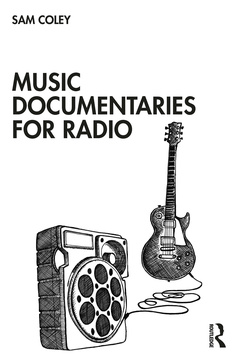Music Documentaries for Radio
Auteur : Coley Sam

Drawing on both academic research and real world practice, this book offers an in-depth investigation into the production of music documentaries broadcast on radio.
Music Documentaries for Radio provides a thorough overview of how the genre has developed technically and editorially alongside a discussion of the practical production processes involved. Digital production equipment and online tools used in music documentary production are discussed in detail, outlining how the development of these technologies shapes the output of producers operating in both the public service and the commercial sectors of the industry. Drawing on his own experiences as an award-winning music documentary producer, the author also looks at how the industry views this form of radio documentary and considers how innovation and technical advances, as well as governmental regulation, have shaped the field. The book demonstrates how changing practices and technical innovations have led to the emergence of multi-skilled, freelance radio producers and how previously separate production roles have merged into one convergent, multifaceted position.
Music Documentaries for Radio is an ideal resource for students and academics in the fields of radio studies, media production, documentary-making, and journalism studies.
Introduction
Defining the music documentary
The music documentary in academic studies
The radio producer
Authenticity in radio production practice
Conclusions
References
Chapter One: Historicising the music documentary
Defining the radio documentary and the music documentary
Online opportunities
The changing role of the radio producer
Conclusions
Note
References
Chapter Two: Public service and commercial radio
Academic investigations in the field of radio studies
The political economy of radio
The viability of music documentaries
Conclusions
Notes
References
Chapter Three: Music
The use of music within music documentaries
Track selection in music documentaries
"Beat matching" in music documentaries
The music "bed" in music documentaries
Conclusions
Notes
References
Chapter Four: Production practices
Comparisons between audio and visual forms of documentary production
Radio production practices
Conclusions
Notes
References
Chapter Five: Interviewing
Securing interview talent for music documentaries
Interviewing for music documentaries
Recording on-location interviews
Recording online and remote interviews
Conclusions
Notes
References
Chapter Six: Presentation
The voice
Structuring and presentation
The role of the presenter in documentary commissioning
Scripting for radio documentary presentation
Conclusions
Notes
References
Chapter Seven: Editing
Editing music documentaries for radio
Structuring music documentary content
Representations of truth
Conclusions
Notes
References
Chapter Eight: Idea generation and commissioning
Commissioning music documentaries to build radio audiences
Audience considerations in commissioning radio documentaries
Programming considerations in music documentaries
Educational and compliance considerations in the commissioning process
Alternative funding streams for music documentaries
The value of radio awards
Conclusions
Notes
References
Chapter Nine: New technologies
Online audio platforms and distribution
Online engagement with contributors and audiences
The re-appropriation of online content
The visualisation of radio content
Conclusions
Notes
References
Chapter Ten: Freelance practices
Freelance radio production in the cultural industries
Workflow in freelance music documentary production
Commissioning opportunities for freelancers
Conclusions
Notes
References
Chapter Eleven: Final thoughts
References
Index
Sam Coley teaches audio production at Birmingham City University and continues to work as a freelance music documentary producer. He has written about popular music, fandom, and new participatory cultures in radio documentary production. Dr Coley is a Trustee of the Charles Parker Archive Trust and serves as a Grand Jury member for the New York Festivals Radio Awards.
Date de parution : 11-2021
15.6x23.4 cm
Date de parution : 11-2021
15.6x23.4 cm
Thèmes de Music Documentaries for Radio :
Mots-clés :
Music Documentary; Documentary Production; Radio production; Audio Documentaries; genre; radio documentary; Follow; broadcast; UK Radio; digital production; Production Practices; multi-skilled; Clip; station management; Documentary Content; art music; Wo; jazz; Commercial Radio; Freelance Producer; public service radio; broadcasting legislation; Digital Production Tools; industry deregulation; Playback; listener loyalty; Public Service Broadcasters; music; TBI; narrative framework; NPR; bespoke soundtracks; Dance Album; sound design; Face To Face; audio documentary; Internet Radio; podcasting; Commissioning Process; RAB; Radio Awards; XFM



